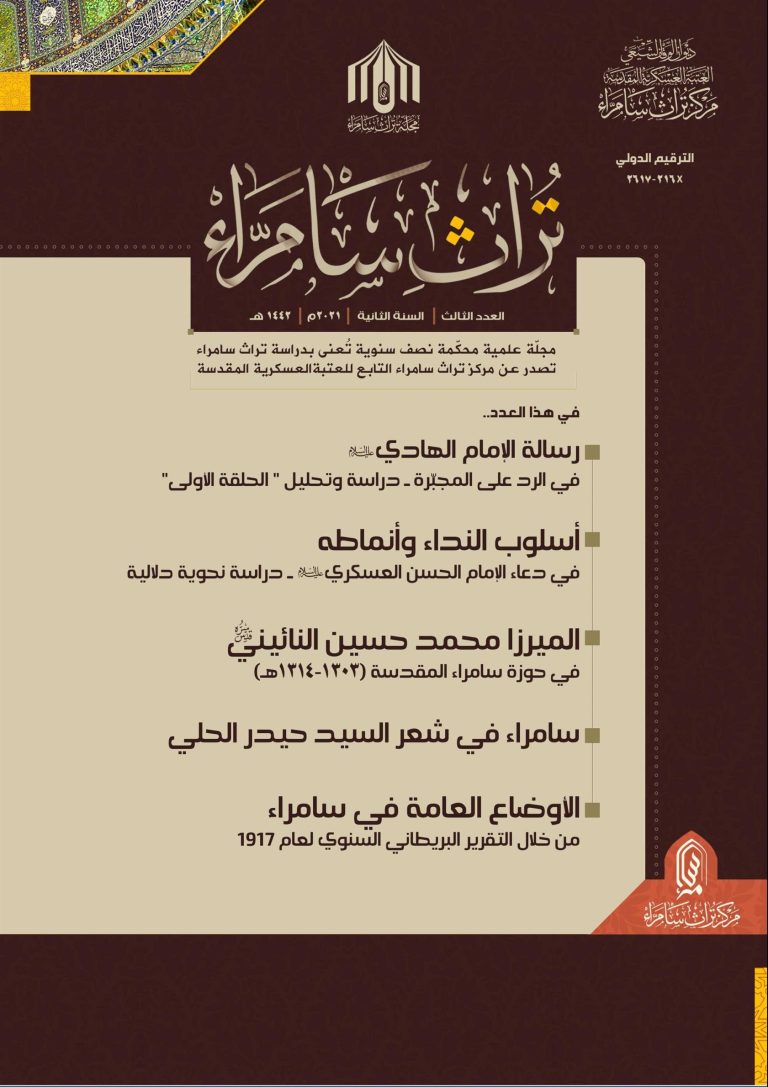Abstract
When the people of Ahwaz are afflicted by the belief of fatalism
and authorization, and sedition is disseminated among them, they write
for Imam Al-Hadi (PBUH) to ask for help. He writes a detailed answer
about that obscurity. Before discussing the core of this obscurity, he gives
them an introduction about it to pave the way for the answer. According
to our knowledge, the oldest source of this message is the book entitled
(Tuhaf Al-Oqol), which is a reliable book by Imamate scholars. It is
praised book and described as: “it is a glorious book that no one wrote
like it”. It is written by Al-Hasan Bin Ali Bin Al-Hussein Bin Shua’aba,
who is a great trusted scholar that has not been criticized.
As for the verification of this message in respect to evidence, proofs
and evidences can be obtained to support the issuance by Imam Al-Hadi
(PBUH). As for the text, it is in harmony with the Holy Quran. The study
tackles three stages with details and analysis.
and authorization, and sedition is disseminated among them, they write
for Imam Al-Hadi (PBUH) to ask for help. He writes a detailed answer
about that obscurity. Before discussing the core of this obscurity, he gives
them an introduction about it to pave the way for the answer. According
to our knowledge, the oldest source of this message is the book entitled
(Tuhaf Al-Oqol), which is a reliable book by Imamate scholars. It is
praised book and described as: “it is a glorious book that no one wrote
like it”. It is written by Al-Hasan Bin Ali Bin Al-Hussein Bin Shua’aba,
who is a great trusted scholar that has not been criticized.
As for the verification of this message in respect to evidence, proofs
and evidences can be obtained to support the issuance by Imam Al-Hadi
(PBUH). As for the text, it is in harmony with the Holy Quran. The study
tackles three stages with details and analysis.
Keywords
Ahwaz People
and the source of the message.
fatalism and Authorization
Imam Ali Hadi (PBUH)
Abstract
بعد أن ابتلي أهل الأهواز بعقيدة الجبر والتفويض، ووقعت الفتنة بين أفراد المجتمع آنذاك كاتبوا الإمام الهادي (عليه السلام) وطلبوا منه العون، فكتب لهم جواباً مفصّلاً عن تلك الشبهة، وقبل دخوله في صلب الجواب قدّم لهم مقدمات؛ عدّة تمهيداً للجواب.
وأقدم مصدر لهذه الرسالة بحسب تتبعنا القاصر هو كتاب )تحف العقول(، وهو كتاب ممدوح عند أعلام الإمامية، حتى قيل فيه: (كتاب جليل لم يصنَّف مثله)، وصاحبه هو: (الحسن بن علي بن الحسين بن شعبة)، عالم جليل ثقة، لم نقف على قادح فيه. وأما إثبات صدور هذه الرسالة من حيث السند، فمن الممكن الحصول على قرائن وشواهد تفيد الوثوق بصدورها عن الإمام الهادي (عليه السلام)، ومن حيث المتن، فإنها موافقة للكتاب العزيز، فلا ضير في الاعتماد عليها. وركّز هذا البحث على ثلاث مراحل، مفصلاً القول في ذلك، مبيّناً ومحلّلاً هذه الرسالة.
وأقدم مصدر لهذه الرسالة بحسب تتبعنا القاصر هو كتاب )تحف العقول(، وهو كتاب ممدوح عند أعلام الإمامية، حتى قيل فيه: (كتاب جليل لم يصنَّف مثله)، وصاحبه هو: (الحسن بن علي بن الحسين بن شعبة)، عالم جليل ثقة، لم نقف على قادح فيه. وأما إثبات صدور هذه الرسالة من حيث السند، فمن الممكن الحصول على قرائن وشواهد تفيد الوثوق بصدورها عن الإمام الهادي (عليه السلام)، ومن حيث المتن، فإنها موافقة للكتاب العزيز، فلا ضير في الاعتماد عليها. وركّز هذا البحث على ثلاث مراحل، مفصلاً القول في ذلك، مبيّناً ومحلّلاً هذه الرسالة.
Keywords
الإمام عليّ الهادي (عليه السلام)، الجبر والتفويض، أهل الأهواز، مصدر الرسالة.
